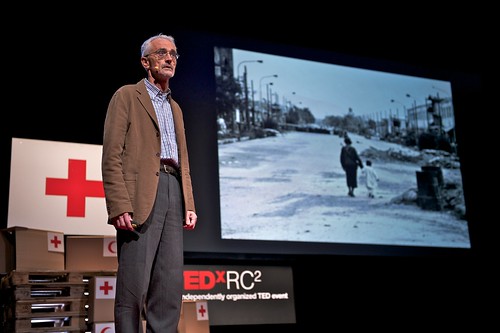Last week, I took a class on International Humanitarian Law (IHL) that was taught by my colleagues here at the American Red Cross. Although I was previously aware of the rules of war and the role of the International Committee of the Red Cross (ICRC), I left the class with a much better understanding of how these concepts have applied to real situations for over 150 years – ever since Henri Dunant was first inspired to start the Red Cross.
With the recent unrest in areas like Libya and Syria and increasing evidence that the younger generation doesn’t know much about the rules of war, it is critical that we do all that we can to educate others about IHL.
Two of the most common questions I’ve seen about IHL are “What purpose does humanitarian law and neutrality have in war?” and “How is it even possible to regulate war?”
When leaving the classroom, I took with me a simple concept that my instructor presented at the very beginning of the class:
International Humanitarian Law attempts to maintain human dignity during armed conflict, preserving a chain of positive consequences that will help prepare for a return to peace.
This very simple statement radically shifted the way I thought about war.
I am fortunate to have never lived in the midst of armed conflict. From my limited point of view, war seemed too violent and chaotic to regulate with rules- much less rules that tell you how to treat the opposing side. However, after considering the statement above, it dawned on me: war is a means to an end, and helps us plan for the long term by mitigating the parts of war that cause undue human suffering.
War takes a toll on all people involved – innocent or otherwise. Through the humanitarian work done by people who work under stressful wartime situations to help others who have suffered, positive effects on the community will lay the groundwork for a more peaceful time.
By preserving this basic humanity on both sides during armed conflict, and by serving all people involved with complete neutrality, the Red Cross can be a balancing force.

Alberto Cairo speaks on stage at the TEDxRC2 event in November 2011. Photo Credit: ICRC
During the recent TEDx Red Cross event in Geneva, an inspiring talk was given by Alberto Cairo, an International Red Cross worker who heads up their orthopedic rehabilitation work in Afghanistan. He talks about how an encounter with a disabled man looking for a chance to regain his dignity through hard work led him to keep his clinics open during periods of active fighting.
As Alberto put it,
Dignity cannot wait for better times.
It’s such a short, but powerful statement. When you consider the impact that people like Alberto can have on a community that has suffered from the effects of war, it’s hard to discount the worthiness of the humanitarian cause.
In another example, a recent Washington Post article writes about Abdul Hakim, an ICRC worker in Afghanistan who has the somber and unique task of retrieving the dead bodies of the Taliban and civilians from the Afghan and American authorities, so that they may be returned to their families and properly buried. Abdul operates as a trusted, neutral entity who does not take sides in the conflict; he merely does his job and helps his country deal with the repercussions of war.
Workers like Abdul Hakim can only do the work that they do by maintaining an impartial, neutral, and independent status that the Red Cross symbol affords them. After reading these stories of people who work to provide comfort, protect human dignity, and serve the individuals affected by war, it become much easier to understand just how crucial it is to have humanitarian laws in the first place.
Although I am definitely not an expert in this area, these examples of the work being carried out by ICRC workers have taught me a lot about what life is like for those in war-torn areas. I feel convinced of the importance of IHL, but I also know that there is much more to learn. Will you join me?
Click on the links below to learn more about IHL and the courses available through the Red Cross:
